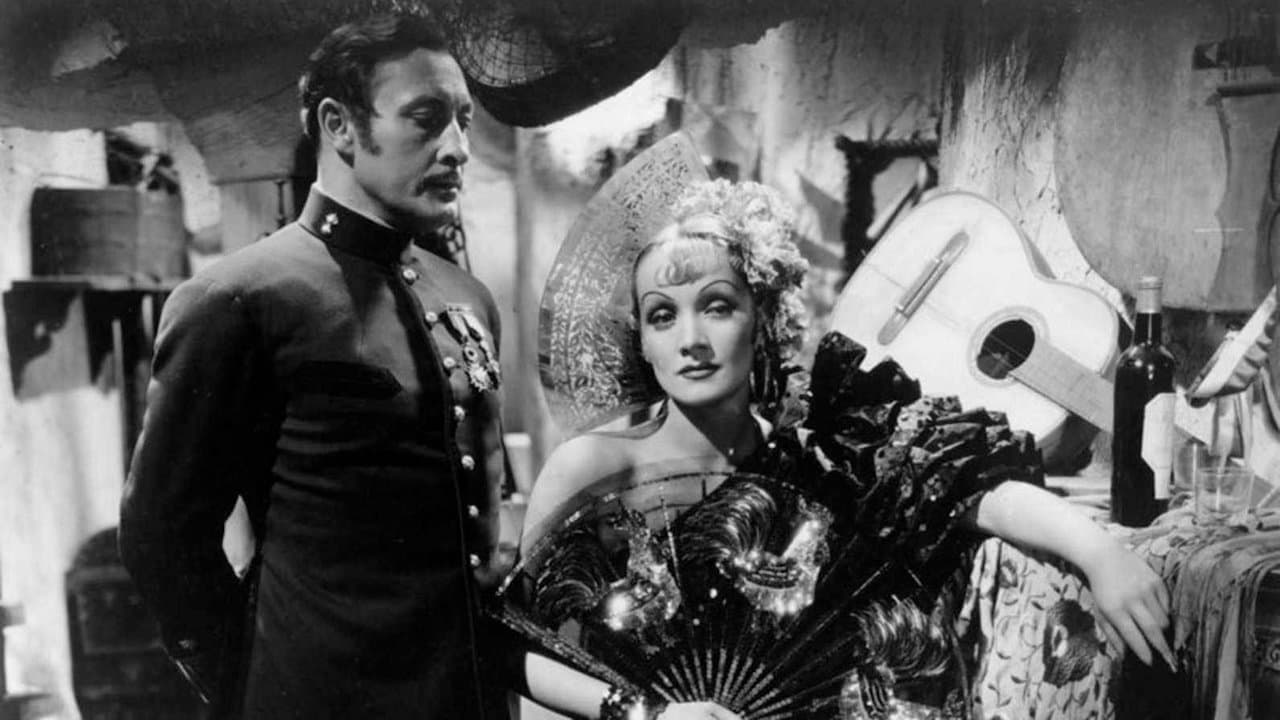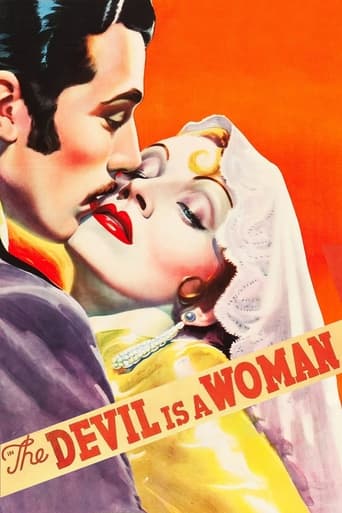

A lot of fun.
... View MoreThe tone of this movie is interesting -- the stakes are both dramatic and high, but it's balanced with a lot of fun, tongue and cheek dialogue.
... View MoreIt's simply great fun, a winsome film and an occasionally over-the-top luxury fantasy that never flags.
... View MoreThis movie tries so hard to be funny, yet it falls flat every time. Just another example of recycled ideas repackaged with women in an attempt to appeal to a certain audience.
... View MoreThe legend is correct; Dietrich never appeared quite so incredibly beautiful as she does in this film. As ever, the star of the show is her face, made up and lit to perfection and effortlessly dominating every shot. Sternberg floats this face amidst a surreal, slightly out of focus, backdrop of carnival streamers and dark clothing which brings to mind the claustrophobic fantasy of 'The Red Empress'.What a pity that all this (somewhat excessive!) cinematography is wasted on such paper-thin characterisation and melodramatic plot. Atwill and Romero play their stock roles adequately enough and resist the temptation to ham it up while Dietrich does her usual 'scene stealing via the eyes' routine. However her character is more caricature than three dimensional human being and you are left half wishing that Atwill had shot her instead of firing into the air.Sternberg was obviously obsessed with Dietrich and devoted himself to displaying her as the most sublimely beautiful representation of womanhood that he could manage. Looking this wonderful, she ought to have broken the hearts of every man and woman in the audience and with a decent plot, a more believable character and less cluttered cinematography then it could have happened. What a waste!
... View More"The Devil is a Woman" marks the end of the celebrated collaboration between Dietrich and von Sternberg and -- if rumor be true and the evidence of this film does tend to bear it out -- it came not a moment too soon for either one. As cold-hearted vamp Concha Perez, Dietrich spends a great deal of screen time pouting, posturing and being photogenically evil, while working her wiles on the likes of Lionel Atwill and Cesar Romero. But there's no heat in it, really; when Dietrich isn't acting mildly amused she appears to be mildly bored. Maybe she's thinking about the next costume change, which is perhaps understandable since she changes costumes about 2 million times during the course of this 75 minute movie. And what costumes they are! Like something out of a drag queen's fever dream. Being Dietrich, of course, she wears them beautifully and director von Sternberg makes sure she is photographed to a fare-thee-well while she's enswathed in them. But costumes and a star and beautiful cinematography (also credited, in part, to von Sternberg) really isn't quite enough to make this 1935 flick fly. John dos Passos is credited with writing the screenplay and it isn't much more than an excuse for Marlene to play the clotheshorse and blow smoke in a lot of mens' faces. This Woman, unfortunately, isn't the Devil; just a minor imp with a wardrobe the size of a Hollywood backlot.
... View MoreThe one thing everyone seems to miss Is that Lionel Atwill looks a lot like Sternberg. Looking at the Dietrich/Sternberg collaborations it's hard not to notice that Adolph Menjou, Herbert Marshall, and Lionel Atwill seem to be Sternberg surrogates, which knowing about the Dietrich/Sternberg relationship, adds a perversity and depth to viewing the films. If you look at the screen test for Blue Angel available on the blue angle DVD, you can already see Dietrich's disdain that seems an enormous part of her screen character in their collaborations. The Devil is a Woman is a story of a man who ruins his career in pursuit of a woman. Pretty hard not to see parallels to Sternberg's career. This was his last big budget film and one that remains a lasting testament to "l'amour fou."
... View MoreA sadly predictable, clichéd story about a woman who was no better than she should have been. Sadly, too, the screenplay is by the once-great experimental novelist John Dos Passos, from an original by French exotic potboiler Pierre Louys. This time Marlene Dietrich is Concha, a manipulative, cold-hearted Spanish beauty. Don Pasqual (Lionel Atwill) raises her from the cigarette factory, but she ditches him. He warns his tall young friend Antonio (Cesar Romero) against her, but to no avail. A duel ensues, Concha reproaches Pasqualito for trying to kill the only man she ever cared for, so he doesn't: he points his pistol at the sky, but Antonio shoots him. But instead of going off to Paris with the young victor, she goes back to the man who would have died for her. With an unexpected bit by Edward Everett Horton as a Spanish Governor. Dietrich plays the part of a Spanish woman by moving constantly, twisting at the waist and posturing and then twisting back, flouncing, tossing her head, and so forth. And she makes faces, and has a curl in the middle of her forehead. The photography is strangely crowded: no outdoor scene can be shot except through a tangle of bare trees, no interior scene can be shot without so much busy detail that it's almost impossible to follow people moving across a room, no consecutive scene of Dietrich can be shot without a major wardrobe change. The carnival scenes are so full of confetti and streamers it's almost like an underwater scene in the Sargasso Sea.
... View More